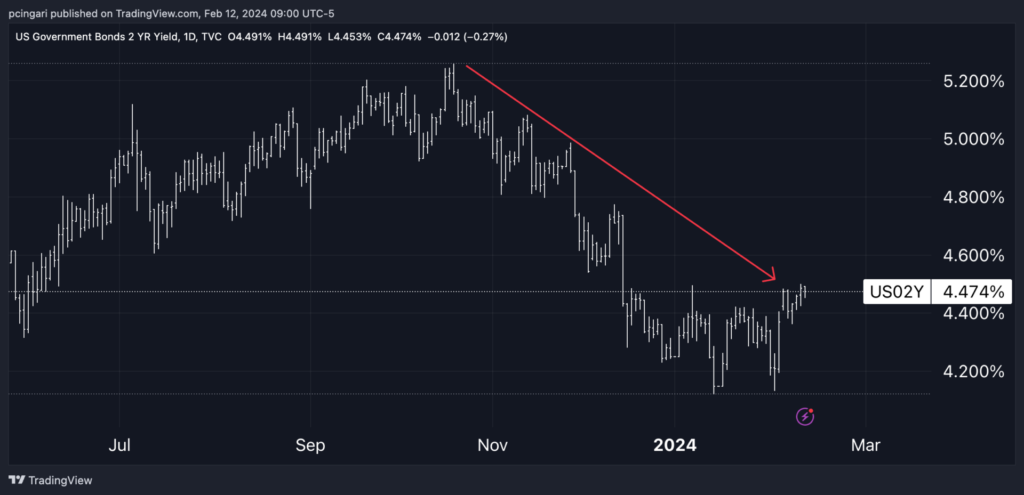Zinger Key Points
- NABE survey shows growing unease with Fed's policies; 21% view them as too restrictive, a two-decade high.
- S&P 500 surpasses 5,000 points amid bets on rate cuts and U.S. economic resilience delaying recession risks.
- The new Benzinga Rankings show you exactly how stocks stack up—scoring them across five key factors that matter most to investors. Every day, one stock rises to the top. Which one is leading today?
Editor’s note: This story has been corrected to make clearer in the headline the expectation of a 59% chance of interest rate cuts by May is a market bet, and to attribute the 85% chance of no rate cut in March to traders.
The latest findings from the National Association for Business Economics (NABE) Economic Policy Survey, summarizing the opinions of 184 economists, indicate a growing unease with the Federal Reserve’s monetary policies.
While a majority still deems the monetary stance as “about right,” there’s a notable shift in sentiment towards viewing these policies as overly restrictive. Only 8% of respondents now consider monetary policy as “too stimulative,” a significant drop from 26% in March 2023.
In contrast, 21% believe the policy is “too restrictive,” marking a notable increase from 14% observed earlier in the year, and representing a two-decade high in skepticism towards the Federal Reserve’s approach.
At the latest Federal Open Market Committee meeting, Fed Chair Jerome Powell suggested that a rate cut in March is unlikely and displayed a lack of urgency to reduce rates, aiming to gain greater confidence in the inflation downtrend.
Market Expectations On Fed
Financial markets are betting on rates unchanged in the short term. Traders expect an 85% probability assigned to no change in Fed rates come March. However, expectations pivot towards easing, with a 59% chance of a rate cut by May and forecasts suggesting up to five reductions by the end of 2024, according to CME Group Fed Watch Tool.
Investors’ bold wagers on forthcoming interest rate cuts, combined with the U.S. economy’s remarkable resilience, which has significantly delayed recession risks, have propelled the U.S. stock market to fresh record highs. Last week, the S&P 500 Index, as represented by the SPDR S&P 500 ETF Trust SPY, broke through the 5,000-point barrier.
Regarding recession forecasts, 24% of surveyed economists believe the U.S. might already be in a downturn or face one by the end of 2024. A further 22% anticipate a recession in 2025, while a more optimistic 36% don’t foresee economic contraction until 2026 or later.
It’s worth noting that many economists and bankers expressed recession fears heading into 2023. They were wrong. The economy grew 3.1%.
Chart: Short-Term Treasury Yields Ease As Investors Bet On Aggressive Fed’s Cuts

External And Domestic Risks
The potential triggers for such downturns include external shocks such as geopolitical tensions, oil supply disruptions, and the impact of a stagnant Chinese economy.
Survey respondents highlight significant geopolitical risks, including Middle East conflicts. U.S. election instability is also a fear, with around 50% rating these as substantial threats to economic stability.
On immigration, a clear majority (two-thirds) advocate for an increase in legally admitted immigrants to the U.S. This contrasts with only 9% favoring a reduction.
Economists also responded positively regarding the long-term impact of recent legislation on U.S. capital expenditures. An overwhelming 82% expect the Infrastructure Investment and Jobs Act, Inflation Reduction Act, and the CHIPS Act to boost sustained capital spending by U.S. firms over the next three to five years, with 65% predicting a modest to positive impact.
Seventy-one percent of survey respondents want to enhance border security. About 68% of respondents want to broaden high-skill visa programs, and 60% want to enlarge low-skill visa initiatives.
Image: Shutterstock.
Edge Rankings
Price Trend
© 2025 Benzinga.com. Benzinga does not provide investment advice. All rights reserved.
Trade confidently with insights and alerts from analyst ratings, free reports and breaking news that affects the stocks you care about.